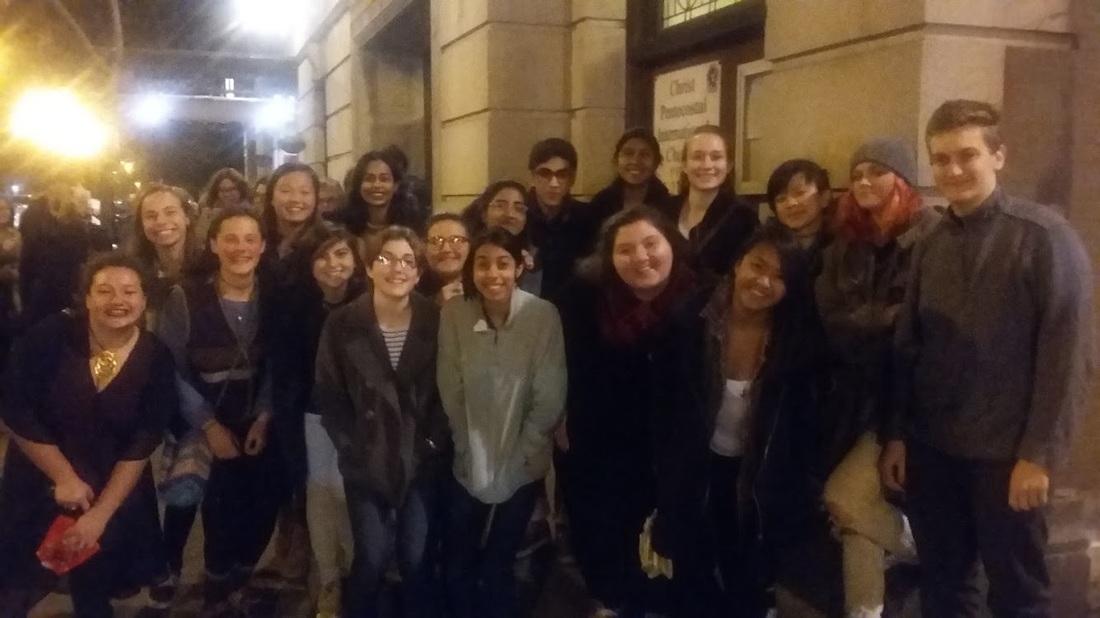Last week (October 29th, 2015), members of Fem Cub had the incredible opportunity to see Gloria Steinem, a famous feminist leader and social activist, and Roxane Gay, a writer and feminist activist, speak. This is a summary and reflection on their ideas, answers to audience questions, and stories.
Both began by reading from their books and then told stories and answered questions. Steinem started off with a comment about how people often don’t recognize when sexism or just discrimination is at play and therefore blame themselves for its effects.
People internalize institutional sexism and women, in particular, tend to blame themselves for the hardships that result from oppression, discrimination, and prejudice. Victim-blaming has become so ingrained in our culture that victims of sexism often victim blame themselves for the discrimination against them.
Women tend to be super-critical of themselves and of other women. In our culture, women don’t strive to be “good enough,” but seek to achieve an impossible ideal. Women strive to be a perfect wife, friend, worker, student, to have a perfect appearance, to be someone who does not and cannot exist.
When talking to Gay about politics, Steinem pointed out that “for men, mediocrity is perfectly acceptable.” Men can have only some experience or some qualifications, and still feel confident in themselves and justified in their ambition. Women, on the other hand, feel constant pressure to always be smarter, more qualified, more agreeable, more charming. In the workplace, she said, “we compare ourselves to the ideal and not to the folks in the position of power.” Women imagine perfection and despair that they are inadequate in comparison.
This is reflected in the feminist movement itself. Feminists try so hard to be “perfect feminists”, who always stand by their ideals and never succumb to what their feminist beliefs tell them is wrong, is unfair, or demeaning. To be a good feminist, one can’t be too feminine, or “girly,” can’t listen to demeaning music or enjoy a movie with sexist comments, can’t make mistakes, can’t be imperfect. Women need to realize that being a “perfect” feminist is next to impossible. Sexism is present in all aspects of our lives: in books, movies, music, advertisements, workplaces, social norms, traditions, and minds. It is impossible to renounce every practice, institution, or enterprise that violates the ideals of feminism and still be able to exist in this society.
In popular culture, feminism has gone from “being about freedom to being about standards.” This is the topic of Gay’s book, “Bad Feminist.” For years she felt excluded from the feminist cause and movement because she felt inadequate, a bad feminist because she liked rap music or fit certain stereotypes.
But Gay argues that there is no list of requirements to be a feminist, there are no rules, no punishments. Feminism is not and should not be about perfection. It should not be judgmental, exclusive, burdensome or intimidating. If feminists can shed this misconception that if they can’t be perfect that they cannot be part of the community, the movement would be much more welcoming, inclusive, open and it would unite people of all genders who simply share the values of equality, respect, and equal opportunity.
An underlying theme that Steinem seemed to be stressing was unity within the movement and unity between all groups fighting for freedom and equity. She compared separate movements to vertical, independent silos. Black women’s struggle. Queer women’s struggle. White women’s struggle. While they each have distinct issues and experiences they are not and should not be the isolated movements that they have been. We need to break down the silos, for all our struggles are connected.
Gay asked Steinem if she ever has lost faith in feminism. She replied, “no. It doesn’t have to be that word, don’t care about the word.” We cannot afford to lose faith– there is so much work to be done and so much at stake. There are problems with feminism, but again, feminism does not have to be perfect to bring meaningful change to the world and to people’s lives. Again, there is so much work to be done… “the way we live now is not human nature. We are not ranked as human beings–we are linked.”
Steinem and Gay on feminism in the political sphere: the media doesn’t cover feminism as part of the national agenda. Ensuring equal rights for women would be a hugely effective way to achieve economic stimulus: equal pay would give women more money to spend, raising women (especially single women and single mother households) out of poverty would lower the number of people who need government aid programs. Steinem added that domestic violence can be a predictor of police violence. Addressing domestic violence could help prevent more occurrences of police brutality, not to mention homelessness, as large numbers of women who are victims of domestic violence end up homeless, often with their children as well. Access to birth control and contraceptives has been proven to lower the number of teenage pregnancies and abortions. Addressing women’s issues benefits the whole nation.
In answering a question about how to encourage inclusive feminism in children, Steinem replied simply that parents and adults should treat each other well and equally. She said a child will do what they see their parents doing. Every time a woman walks past a mirror and criticises her body the child sees. Every time a woman is shut down or disrespected a child sees. Children see, children listen. Children are the hope for a better future. She also criticized the sexism that surrounds and permeates all forms and levels of culture: books, TV shows, movies, etc. Again, we cannot be perfect feminists and block out all these from our lives but we can encourage people to question and be critical and encourage writers, musicians, or other contributors to shared culture to create a future where women can walk through a day without feeling objectified, sexualized, or of less value than men.
Steinem answered a question on how privileged people should act in solidarity to help and respect those who are of a less privileged class, nationality, race, or orientation. She simply replied: listen. People with the problem know the solution better than outsiders or people of power or privilege. She told a story about when she traveled to Zambia. She visited a small village and sat down with women of the village to listen to what they had to say and see what needed to be done. The issue was with women moving to cities and becoming prostitutes and often victims of sex trafficking. Steinem asked what needed to be done, and they said what they needed was not government lobbying for the eradication of sex trafficking, was not economic stimulus or anything like that. They needed an electrified fence to keep out the elephants from eating their crops. Steinem raised some funds and they built the fence, cleared acres of land and when Steinem returned months later they had a thriving maize crop and women did not have to become prostitutes to survive anymore. People with power assume they know how to help but they are more idealistic because they have enough power to think big change possible. But solutions should not be top-down. Steinem also advised people to send aid directly and not through huge foundations. Ask what you can do for people, they know.
Roxane Gay, who is black, when asked how feminists who are white can be the best possible allies to women of color and other minority groups of feminists, had a beautiful answer: She pleaded for unity, for solidarity instead of alliance. She said, “let go of the word ally. My struggle needs to be your struggle. You have to be doing it [activism] for all of us… even if it is not your concern it is someone’s concern and therefore it matters.” In other words, break down the silos, the socially constructed barriers between women and feminists of different races, orientations, classes, and so on. Break down those barriers and bring them all together, for the struggle of one woman is a struggle that we all should be fighting against. The institutions that systematically discriminate against women, those very institutions that feminists are working to fix, created these unnatural barriers between different groups. We should not be daunted or fooled by them. Feminism fights for equality, for freedom, for the destruction of institutional barriers and divisions drawn between peoples. If we really are fighting for these ends, we must deny and denounce these artificial, traditional barriers that have restrained and damaged so many for so long.
I think the main take-away from this event is that unity and solidarity are the key to a hopeful future, not just for the feminist movement but for all seeking justice, equity and love. Feminists today should be working every day to build bridges between silos, between the many separate movements that are each fighting to achieve the same end. Feminists should be working to create bonds and to be kind to one another, to embrace each other’s (and their own) imperfections. Steinem, telling a story about her experience in a Native American meeting of women, said she had “much faith in a circle of women.” I have much faith in a united circle of all women, of all colors, orientations, and backgrounds, holding hands, eyes up, shoulders squared, and hearts full of love for each other. I have much faith in a circle of human beings, standing together, to face the world of inequality and hardship and fight tirelessly for good.
There is so much that can keep us apart, keep us separate from others. There is so much that can build a barrier between groups of people. But we must determine to be better than that. We have come so far, so damn far. We are fighters together, we are broken and we are victors together.
Think of how far we’ve come as a divided and hated movement. That’s the power of women. Think of how much further we can progress when all the separate feminist movements come together and recognize the sameness in each other’s hearts. That’s the power of women. That’s the power of people. That’s the power of compassion, the power of solidarity. That is the future.











